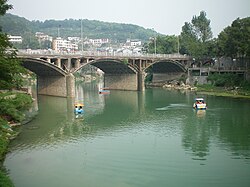Jishou
Jishou
吉首市 | |
|---|---|
| Country | People's Republic of China |
| Province | Hunan |
| Autonomous prefecture | Xiangxi |
| Area | |
• Total | 1,062.46 km2 (410.22 sq mi) |
| Population (2010)[2] | |
• Total | 301,460 |
| • Density | 280/km2 (730/sq mi) |
| Time zone | UTC+8 (China Standard) |
| Postal code | 4160XX |
| Website | zgjs |
Jishou (Chinese: 吉首; pinyin: Jíshǒu) is a county-level city and the seat of Xiangxi Tujia and Miao Autonomous Prefecture, Hunan province, China.
History
Jishou has a history of more than 2,000 years dating back to the Qin dynasty. In those days, it was affiliated with Qianzhong Prefecture (黔中郡). During the Song dynasty, a town government was established in a stockaded village, Zhenxi (镇溪寨; 鎮溪寨), which in the Ming dynasty became the Zhenxi soldiers and civilians battalion (镇溪军民千户所; 鎮溪軍民千戶所). Qianzhou Prefecture (乾州厅) was created during the Qing dynasty. During the Republic of China era it was known as Qian County (乾县; 乾縣) In 1953 the area was renamed Jishou county, with two adjacent cities, Jishou and Qianzhou. In 1982 Jishou city became the capital of Xiangxi Tujia and Miao Autonomous Prefecture. The city of Qianzhou (乾城) now lies just south of Jishou city.[4]
Geography
Jishou lies east of the Wuling Mountain range. About 80% of the city's terrain is low hills or low mountains. The highest elevation is 964.5 meters, at Liantaifeng (莲台峰; 蓮台峰, near the town of Aizhai (矮寨) and the lowest point is 142 meters, near the town of Hexi (河溪镇; 河溪鎮).[5][better source needed] The Dong River (峒河), a tributary of the Wu (Yuan River),[Chinese script needed] runs west to east through the city.

Population
Jishou County had a population of 291,200 in the year 2008, including an agricultural population of 163,100, or 56% of the population. The urban population was 192,500. About 77.3% of the population belonged to the Miao or Tujia minorities, with 121,000 Miao and 101,200 Tujia. Members of China's predominant Han ethnic group comprise the rest of the population.[6]
Education
Jishou has two institutions of higher education:
- Jishou University (吉首大学)
- Normal College of Jishou University (吉首大学师范学院)
Economy
In 2001, the Gross Domestic Product in Jishou was 19.45 billion yuan, with a revenue of 1.45 billion yuan. Jishou produces fruits, especially kiwis and oranges, vegetables, livestock and poultry, and tobacco.[7] Tourism is becoming an important industry, since the ancient city of Fenghuang, is about 30 minutes away and Dehang National Park is about 40 minutes away.
Transportation
- Bus routes run from Jishou to numerous towns and cities within Xiangxi and farther afield.
- Direct trains connect Jishou to many of China's major cities, including Beijing, Shanghai, Guangzhou, and Changsha.
- Jishou lacks an airport; the closest one with commercial service is located two hours away in Zhangjiajie.
- China National Highway 209, China National Highway 319
- The Aizhai Bridge, one of the world's highest and longest suspension bridges, is located approximately 20 minutes outside of town.
Photo
References
- ^ Xiangxi Tujia and Miao Autonomous Prefecture Land Use Plan (2006–20)/《湘西土家族苗族自治州土地利用总体规划(2006-2020年)》.Template:Zh icon Accessed 8 July 2014.
- ^ 湘西自治州2010年第六次全国人口普查主要数据公报 (in Chinese). Xiangxi Prefecture People's Government. Retrieved 9 July 2014.
- ^ "Jishou" (Map). Google Maps. Retrieved 2014-07-02.
- ^ http://so.07430743.com/view/598.html
- ^ http://baike.baidu.com/view/182748.htm
- ^ http://www.zgjs.gov.cn/plus/list.php?tid=450
- ^ http://www.zgjs.gov.cn/plus/list.php?tid=449

